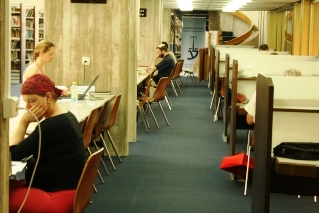 CC image by Trillia-Fidei-Bagwell
CC image by Trillia-Fidei-BagwellIn July 2011, the Israeli Prison Service (IPS) decided to discontinue studies at the Open University for prisoners classified as security prisoners, as part of a policy designed to apply pressure to secure the release of Gilad Shalit. On 23 November 2011, the Association for Civil Rights inIsraelfiled an appeal with the Central District Court against the IPS decision, on behalf of a prisoner that had been learning at the Open University since 1996 and was four credits away from completing his graduate degree. The petition claimed that this was an entirely arbitrary decision that was not based on any legitimate considerations regarding the prisoner himself. It additionally claimed that the decision is patently unconstitutional as it relates to the prisoner as a means to an ends external to himself thus violating his dignity. This constitutes extreme discrimination on the grounds of nationality and affects the petitioner’s fundamental rights to freedom of expression and intellectual freedom.
Even after the release of Gilad Shalit in October 2011, IPS decided not to revoke the policy and responded in court that studies at the Open University are not a right but a privilege and the IPS is not obligated to grant this privilege to security prisoners. The IPS additionally responded in court that it is known by members of the security establishment, according to information received by them, that terrorist organizations transfer funds to security prisoners and their families as a reward for their actions. The assorted benefits we provide to security prisoners, they claim, are being used to transfer a negative message about the consequences of imprisonment in Israeli prisons.
In November 2011, it was claimed at the Central District Court hearing that we are dealing with the violation of a fundamental right to education and to acquire knowledge, a right that is recognized in the case law. It was emphasized that considering the accepted principle that individual rights do not stop at the prison gates, the State can not deny an entire group the right to learn, only individuals under exceptional circumstances. It was also asserted that there was no security considerations relevant that justify the denial of this right and that there is no logical connection between the issue of transferring funds to security prisoners and learning at the Open University.
The court rejected the petition. Judge Avraham Tal determined that we are not dealing with the denial of a right, but with the granting of a benefit only, and that in any case the violation is proportionate in light of security considerations.
ACRI filed a motion for leave to appeal to the Supreme Court. In its appeal it claimed that the ruling of the District Court that the right to learn in university is only a benefit, one that the IPS is not obligated to grant, is contrary to the rulings of the Supreme Court which recognized the rights of prisoners to exercise their constitutional right to intellectual freedom which includes freedom of expression and the acquisition of education and knowledge. It also alleged the existence of discrimination between criminal prisoners who are allowed to learn, and security prisoners.
The Supreme Court rejected the appeal. It stated in its judgment that the constitution does not recognize a fundamental right to academic studies, and therefore there is a need only to address the claim of discrimination. In this regard, case law has recognized time and time again the legality of restrictions that are imposed on security prisoners but not criminal prisoners, and as a result of that, the IPS decision is legal. The court asked the IPS to reconsider their decision for prisoners who are close to completing their degree and that if they don’t, those prisoners can choose to file a new petition before the court.
Case 4902-08-11 : Yunis v. Prison Service
Request for Appeal 4063/12 : Yunis v Prison Service
Attorneys: Lila Margalit, Anne Suciu
To view the legal documents in Hebrew:
The petition
The Central District Court decision
The application for leave to appeal to the Supreme Court
The Supreme Court decision








Pingback: Israel bars prisoner studies on grounds that most popular course is 'Genocide, featuring Nazis, gypsies,